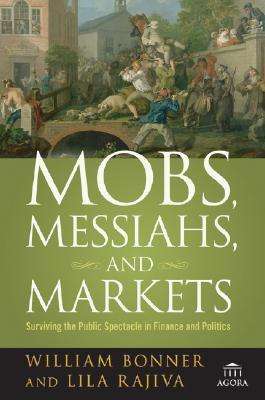Mobs, Messiahs, and Markets: Surviving the Public Spectacle in Finance and Politics
Published by Wiley, 2007, hardcover, index, 428 pages, condition: as new.
An insightful look at how to succeed by going against the crowd Collectively, people think and act in ways that are different from how they think and act as individuals. Understanding these differences, says William (Bill) Bonner-a longtime maverick observer of the financial world and the vagaries of the investing public-is vital to preserving your wealth and personal dignity. From the witch-hunts of the early modern world to the war on terror, from dot-com mania to the real estate bubble, people have always been caught up in frauds, conceits, and wild guesses-often with devastating results. In Mobs, Messiahs, and Markets, Bonner and coauthor Lila Rajiva show groupthink at work in an improbable array of instances throughout history and reveal why swimming against the current pays. The authors' cautionary tale of bubble economies reveals how the gush of credit let loose by Alan Greenspan has wreaked havoc on our lives-but their thoughtful and always entertaining approach also offers some sound investing principles for avoiding the pitfalls of the public spectacle, thinking for yourself, and protecting your money, your sanity, and your soul.
At the beginning of the book, there is a preface that seeks to explain that this book will never win a Nobel Prize because it is readable. That said, this book is also more than a bit prophetic, in that it warns of the unsustainable nature of debt and the rise of property prices just before the great recession hit. To be sure, there is a lot of insight that one can gain from a book like this, including a high degree of skepticism for those whose overly simplistic views of the world lead them to think of themselves as being fit to mold the world into the image of their own ideologies, something that has been a critical problem in the West since at least the Enlightenment. This book comes with a large amount of snark, and as a fairly snarky person I do not have a problem with that. That said, there are going to be people who are offended by a book like this and are not going to bother to read it to recognize that it has a lot of insight along with a large amount of disrespect for authorities in politics and economics within the contemporary and historical world.
Coming in at about 400 pages of material, this book is divided into six parts and seventeen chapters. The book begins with a three chapter critique of impure reason that demonstrates the way that our reasoning processes go awry (I), including chapters on do-gooders gone bad (1), evolutionary explanations for why people's behavior goes crazy (2), and discussions of astrological influence (3). After that the authors spend a couple of chapters talking about how mobs go awry (II), including a chapter on witch hunts (4) and another on jingoistic war scares (5). Then the authors turn their attention to militant messiah figures (III), with chapters on the issue of war and memory (6), the way that empires are built on a lot of delusions (7), and the negative side of supposed revolutionary heroes (8) of the left. The fourth part of the book then turns its attention to attacking Thomas Friedman's view of the flattening of the world (IV) with a discussion of the problem of numbers (9), what flat earth arguments ignore (10), and problems involving trade (11). After that the author looks at the problem of bubbles (V), with chapters on the end of the bubble (12), million dollar trailers (13), central bank frauds (14), and the beginnings of the problem of the current bubble (15). Finally, the authors end with a discussion of avoiding the mobs (VI) that encourages one to avoid being a chump of Wall Street (16), and the way that we are duped by our hearts (17), after which there are notes and an index.

